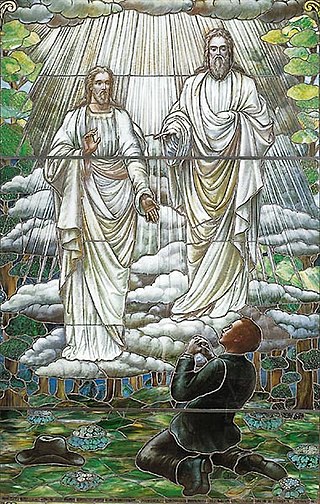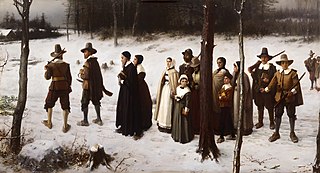Evangelicalism, also called evangelical Christianity or evangelical Protestantism, is a worldwide interdenominational movement within Protestant Christianity that emphasizes the centrality of sharing the "good news" of Christianity, being "born again" in which an individual experiences personal conversion, as authoritatively guided by the Bible, God's revelation to humanity. The word evangelical comes from the Greek word for "good news" (euangelion).
Christian fundamentalism, also known as fundamental Christianity or fundamentalist Christianity, is a religious movement emphasizing biblical literalism. In its modern form, it began in the late 19th and early 20th centuries among British and American Protestants as a reaction to theological liberalism and cultural modernism. Fundamentalists argued that 19th-century modernist theologians had misunderstood or rejected certain doctrines, especially biblical inerrancy, which they considered the fundamentals of the Christian faith.
The following outline is provided as an overview of and topical guide to Christian theology:

The mainline Protestant churches are a group of Protestant denominations in the United States and in some cases in Canada largely of the theologically liberal or theologically progressive persuasion that contrast in history and practice with the largely theologically conservative Evangelical, Fundamentalist, Charismatic, Confessional, Confessing Movement, historically Black church, and Global South Protestant denominations and congregations. Some make a distinction between "mainline" and "oldline", with the former referring only to denominational ties and the latter referring to church lineage, prestige and influence. However, this distinction has largely been lost to history and the terms are now nearly synonymous.
In Christianity, Neo-orthodoxy or Neoorthodoxy, also known as theology of crisis and dialectical theology, was a theological movement developed in the aftermath of the First World War. The movement was largely a reaction against doctrines of 19th century liberal theology and a reevaluation of the teachings of the Reformation. Karl Barth is the leading figure associated with the movement. In the U.S., Reinhold Niebuhr was a leading exponent of neo-orthodoxy. It is unrelated to Eastern Orthodoxy.
Progressive Christianity represents a postmodern theological approach, which developed out of the liberal Christianity of the modern era, itself rooted in the Enlightenment's thinking. Progressive Christianity is a postliberal theological movement within Christianity that, in the words of Reverend Roger Wolsey, "seeks to reform the faith via the insights of post-modernism and a reclaiming of the truth beyond the verifiable historicity and factuality of the passages in the Bible by affirming the truths within the stories that may not have actually happened."
Liberal Christianity, also known as liberal theology and historically as Christian Modernism, is a movement that interprets Christian teaching by taking into consideration modern knowledge, science and ethics. It emphasizes the importance of reason and experience over doctrinal authority. Liberal Christians view their theology as an alternative to both atheistic rationalism and theologies based on traditional interpretations of external authority, such as the Bible or sacred tradition.
The Evangelical left is a Christian left movement in Evangelical Christianity that affirms conservative evangelical theology and are politically progressive. It is mainly based in the US, but is also found in Latin America.
Biblical literalism or biblicism is a term used differently by different authors concerning biblical interpretation. It can equate to the dictionary definition of literalism: "adherence to the exact letter or the literal sense", where literal means "in accordance with, involving, or being the primary or strict meaning of the word or words; not figurative or metaphorical".

The fundamentalist–modernist controversy is a major schism that originated in the 1920s and 1930s within the Presbyterian Church in the United States of America. At issue were foundational disputes about the role of Christianity; the authority of the Bible; and the death, resurrection, and atoning sacrifice of Jesus Christ. Two broad factions within Protestantism emerged: fundamentalists, who insisted upon the timeless validity of each doctrine of Christian orthodoxy; and modernists, who advocated a conscious adaptation of the Christian faith in response to the new scientific discoveries and moral pressures of the age. At first, the schism was limited to Reformed churches and centered around the Princeton Theological Seminary, whose fundamentalist faculty members founded Westminster Theological Seminary when Princeton went in a liberal direction. However, it soon spread, affecting nearly every Protestant denomination in the United States. Denominations that were not initially affected, such as the Lutheran churches, eventually were embroiled in the controversy, leading to a schism in the United States.
Bibliolatry is the worship of a book, idolatrous homage to a book, or the deifying of a book. It is a form of idolatry. The sacred texts of some religions disallow icon worship, but over time the texts themselves are treated as sacred the way idols are, and believers may end up effectively worshipping the book. Bibliolatry extends claims of inerrancy—hence perfection—to the texts, precluding theological innovation, evolving development, or progress. Bibliolatry can lead to revivalism, disallows re-probation, and can lead to persecution of unpopular doctrines.

Christianity is the most prevalent religion in the United States. Estimates from 2021 suggest that of the entire U.S. population about 63% is Christian. The majority of Christian Americans are Protestant Christians, though there are also significant numbers of American Roman Catholics and other Christian denominations such as Latter-day Saints, Orthodox Christians and Oriental Orthodox Christians, and Jehovah's Witnesses. The United States has the largest Christian population in the world and, more specifically, the largest Protestant population in the world, with nearly 210 million Christians and, as of 2021, over 140 million people affiliated with Protestant churches, although other countries have higher percentages of Christians among their populations. The Public Religion Research Institute's "2020 Census of American Religion", carried out between 2014 and 2020, showed that 70% of Americans identified as Christian during this seven-year interval. In a 2020 survey by the Pew Research Center, 65% of adults in the United States identified themselves as Christians. They were 75% in 2015, 70.6% in 2014, 78% in 2012, 81.6% in 2001, and 85% in 1990. About 62% of those polled claim to be members of a church congregation.

Mormonism and Nicene Christianity have a complex theological, historical, and sociological relationship. Mormons express their doctrines using biblical terminology. They have similar views about the nature of Jesus Christ's atonement, bodily resurrection, and Second Coming as mainstream Christians. Nevertheless, most Mormons do not accept the doctrine of the Trinity as codified in the Nicene Creed of 325 and the Nicene-Constantinopolitan Creed of 381. Although Mormons consider the Protestant Bible to be holy scripture, they do not believe in biblical inerrancy. They have also adopted additional scriptures that they believe to have been divinely revealed to Joseph Smith, including the Book of Mormon, the Doctrine and Covenants, and the Pearl of Great Price. Mormons practice baptism and celebrate the sacrament of the Lord's Supper, but they also participate in other religious rituals. Mormons self-identify as Christians.

Protestantism is a branch of Christianity that follows the theological tenets of the Protestant Reformation, a movement that began in the 16th century with the goal of reforming the Catholic Church from perceived errors, abuses, and discrepancies.

Protestantism is the largest grouping of Christians in the United States, with its combined denominations collectively comprising about 43% of the country's population in 2019. Other estimates suggest that 48.5% of the U.S. population is Protestant. Simultaneously, this corresponds to around 20% of the world's total Protestant population. The U.S. contains the largest Protestant population of any country in the world. Baptists comprise about one-third of American Protestants. The Southern Baptist Convention is the largest single Protestant denomination in the U.S., comprising one-tenth of American Protestants. Twelve of the original Thirteen Colonies were Protestant, with only Maryland having a sizable Catholic population due to Lord Baltimore's religious tolerance.

In the United States, evangelicalism is a movement among Protestant Christians who believe in the necessity of being born again, emphasize the importance of evangelism, and affirm traditional Protestant teachings on the authority as well as the historicity of the Bible. Comprising nearly a quarter of the U.S. population, evangelicals are a diverse group drawn from a variety of denominational backgrounds, including Baptist, Mennonite, Methodist, Pentecostal, Plymouth Brethren, Quaker, Reformed and nondenominational churches.

Marginal at first, news reports and political analysts have pointed the important weight that the Evangelical Christian community has and its impact in electoral politics in Latin America, even helping in the electoral victories of conservative candidates.
Moderate Christianity is a theological movement in Christianity that seeks to make decisions based on spiritual wisdom.








